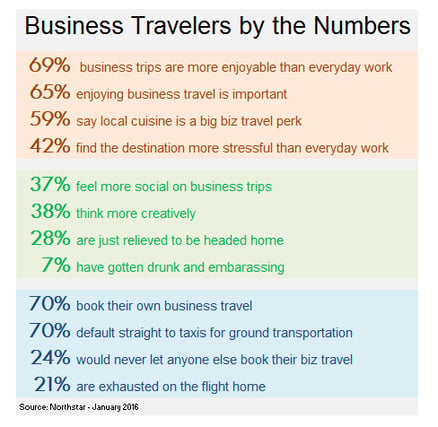Is Your Travel Management Company Positioned for Growth?
By David Eddy on Mar 10, 2016 11:11:05 AM

Like every other sector of the travel industry, steady growth in business travel doesn’t necessarily translate into increased sales for every travel management company (TMC). The travel sector is challenging because the business model is complex and competition is fierce.
The business model is complex because it has to content with three related but competing priorities: the most visible priority is the business traveler; the second priority is the corpora te travel policy (hopefully used by the business traveler; and the third priority is the actual customer – the business traveler’s employer. To be competitive, the travel company must balance these priorities; stay focused on effectively managing – rather than arranging - the customers travel activity. To prosper, the travel management company must take several specific steps that will position it for growth.
te travel policy (hopefully used by the business traveler; and the third priority is the actual customer – the business traveler’s employer. To be competitive, the travel company must balance these priorities; stay focused on effectively managing – rather than arranging - the customers travel activity. To prosper, the travel management company must take several specific steps that will position it for growth.
These steps are different from those in the leisure travel sector because business travel has a very different activity profile: shorter booking timelines; dependencies on other travelers; arrival and departure relationships to meetings and customer schedules. When constant corporate pressure to control costs is added, it’s no surprise that over 80% of business traveler employers use the services of a TMC.
The TMC Value Proposition
A travel management business has the resources to provide the customer service and support required by the traveler and provides a threefold value proposition to its corporate accounts:
Travel logistics: the ability to facilitate efficient travel in two ways: one is travel booking software with an intuitive user interface for quick online travel purchases as well as necessary changes; the second is a travel management software system that supports a broad range of travel channels, service offerings and cost-effective pricing options.
Performance: through negotiations that take advantage of economies of scale – those brought to the table by the travel company itself and those based on the customer’s own travel patterns and purchase volume, the travel company is able to lower and control customer travel costs.
Management: the travel company provides management visibility into customer travel expenses with customized dashboards, and also supports real-time travel policy compliance (e.g. challenging a submitted reservation that violates corporate travel policy, and/or requiring specific approvals prior to booking) with its travel technology.
Positioning for Growth
Unless a travel management company is able to balance its three priorities: traveler; policy and corporate customer and keep them equally represented in its value proposition, it will be difficult to succeed. The following six steps will enable the company to grow by providing travelers with the experience they want; maintaining high policy compliance and hitting the travel expense targets of the corporate customer.
Proactive Travel Policy Reviews: in many instances a new corporate account will simply continue with its existing travel policy rather than revising it or creating a new one. Regardless, the travel company should review the policy and use its lessons learned at other clients to make good suggestions for improvement. It may discover old issues that will respond to new ideas. It may be able anticipate issues that can be avoided altogether.
A travel management company should watch for travel policies originating within the customer’s procurement department. One reason is the travel industry is a highly specialized field that should be handled by a travel management firm – not procurement. Another is that procurement departments have many good points but are known for “tin ears” when it comes to designing co mpany policies for employee services. If they’ve authored the incumbent policy, it needs to be looked at.
mpany policies for employee services. If they’ve authored the incumbent policy, it needs to be looked at.
Consolidate and Communicate: funneling the customer’s booking volume into a consolidated list of preferred travel suppliers is an essential tool for lowering and controlling costs. At the same time a communications plan must explain the nature and rationale of any consolidation.
Business travelers all have their favorite airlines and hotel chains. However, they can certainly understand why supplier consolidation is a simple fact of business life. Laying out the what, the why and how ahead of time will do wonders for compliance and morale.
Invest in Technology: the TMC must have a well thought out travel technology roadmap to deliver consistent updates and innovations for such key features as: simplified booking; real time information on bookings & status; policy compliance; service level monitoring; issuance of travel and weather alerts. There should be a particular emphasis on travel technology that supports personalization of travel choices based customer preferences and behaviors.
Mobility: the technology roadmap must include a client-customized, highly functional travel app. Mobility is a huge trend across all service and consumer sectors and a travel app has moved from “nice to have” to mandatory status. Surveys show highest use for these travel app features: real-time flight information and instant itinerary access & sharing.
Dedicated Agents: a high priority should be given to the assignment of dedicated agents to support specific areas of the customer’s operations, perhaps by business units or departments. There’s simply no substitute for personal services, especially when a problem hits when the traveler is far from home. Yes, it is less expensive to apply personal service after an issue has escalated, but proactively implementing dedicated agents should be viewed as an investment in the account.
Reporting: the technology roadmap must also provide customized, effective reporting on the customer’s travel expense trends along with analytics and predictive forecasting. The scope of reporting should include real-time dashboards for SLA transparency and proactive measures, plus comprehensive, scheduled reports for revising strategies and tactics.
The significant of these steps becomes apparent when a travel company takes them as a unified whole and each step is executed fully and completely. Individually, any of these steps will be beneficial but not transformative. Together, they will cover all three account priorities and sharpen all three elements of the TMC value proposition, positioning the company for sustainable growth.
- travel technology (60)
- Travel Industry (49)
- travel agency (31)
- travel erp (31)
- travel trends (28)
- travel booking system (23)
- TINA (21)
- travel company (19)
- Tour Operator (18)
- Product updates (17)
- Travel Management Company (17)
- AIDA (15)
- TBS (15)
- Business Travel (14)
- dcs plus news (14)
- tour operator solution (14)
- travel website (14)
- travel erp system (13)
- Mobile App (12)
- Travel App (12)
- mid back office solution (12)
- trends (12)
- Corporate Travel (11)
- Industry Events (11)
- Mobile Technology (11)
- TMC (11)
- travel agents (11)
- erp (10)
- erp system (10)
- Tour Operators (9)
- Travel booking engines (9)
- dcs plus (9)
- online travel agency (9)
- travel agent (9)
- Mobile Bookings (8)
- travel (8)
- travel agencies (8)
- 2017 (7)
- Business Traveler (7)
- Mobile Travel (7)
- travel business (7)
- travel software (7)
- Digital Technology (6)
- Insider (6)
- Millennials (6)
- Online booking systems (6)
- Travel Management Companies (6)
- process automation (6)
- travel companies (6)
- Big Data (5)
- Partners interviews (5)
- Tour Operator Software (5)
- customer retention (5)
- travel agency technology (5)
- Booking engines (4)
- CSBT (4)
- Mobile Device (4)
- Mobile travel apps (4)
- OTAs (4)
- Static databases (4)
- Tour Companies (4)
- Travel Policy (4)
- Travel booking systems (4)
- Travel suppliers (4)
- back office automation (4)
- corporate self booking tool (4)
- millennial travelers (4)
- online travel (4)
- responsive travel website (4)
- technology (4)
- travel website conversion (4)
- 2016 (3)
- Content mapping (3)
- Databases (3)
- Demographics (3)
- Food and Adventure Tourism (3)
- Mobile Apps (3)
- Travel Distribution Channels (3)
- Travel Management Software (3)
- Travel customers (3)
- Travel history (3)
- anniversary (3)
- automated processes (3)
- content matching (3)
- global travel industry (3)
- social media (3)
- travel agency workflow (3)
- travel back office (3)
- travel marketing (3)
- travel process automation (3)
- AI in travel (2)
- Advanced Booking Systems (2)
- B2B Travel Resellers (2)
- Bleisure (2)
- Branding (2)
- Business Process Automation (2)
- Business Travelers (2)
- Customer engagement (2)
- Financial Reporting (2)
- Food Tourism (2)
- Inbound Marketing (2)
- Infographic (2)
- Leisure Travel (2)
- Saas (2)
- Templates (2)
- Travel Costs (2)
- Travel bookings (2)
- Travel start-up (2)
- Travel website abandonment (2)
- WTM 2016 (2)
- abandoned travel bookings (2)
- engagement marketing (2)
- internet booking engine (2)
- millennial traveler (2)
- new travel company (2)
- office (2)
- online reputation management (2)
- online travel reviews (2)
- reporting (2)
- software (2)
- start-up tips (2)
- travel agency management (2)
- travel agency website (2)
- travel experience (2)
- travel mobile app (2)
- travel packages (2)
- travel reservation system (2)
- travel system (2)
- travelers (2)
- web-based travel erp (2)
- 2020 (1)
- 360 Customer View (1)
- Advanced Accommodation Contract Management (1)
- Adventure travelers (1)
- Apps (1)
- B2B Reseller (1)
- B2B Resellers (1)
- B2C (1)
- BI Reporting (1)
- Budget traveler (1)
- Cancellations (1)
- Chat (1)
- Chinese millennial (1)
- Cloud (1)
- Cognitive computing (1)
- Comparison shopping (1)
- Conference (1)
- Contact matching (1)
- Content (1)
- Cruise (1)
- Culinary traveler (1)
- Customer relations (1)
- Digital Innovation (1)
- Digital Natives (1)
- Documents (1)
- Emerging market travelers (1)
- Emerging markets (1)
- Errors (1)
- Experimental travel (1)
- Financial Dashboard (1)
- Import rates (1)
- Instant messaging (1)
- Integrate with Accounting Software (1)
- Internet (1)
- Luxury traveler (1)
- Mobile Transaction (1)
- Mobile payments (1)
- NDC distribution (1)
- Operational Reporting (1)
- Reseller networks (1)
- Resellers (1)
- Response (1)
- Subagents Network (1)
- TINA Academy (1)
- TTE (1)
- Travel Reseller Network (1)
- Travel Revenue Management (1)
- Travel booking problems (1)
- Travel finance reporting (1)
- Travel stats (1)
- WTM (1)
- abandonment (1)
- accomodations (1)
- advanced reporting (1)
- airline direct connect technology (1)
- ancillary services (1)
- cloud computing (1)
- collection (1)
- collection challenges (1)
- common data model (1)
- conversion rates (1)
- corporate mobile app (1)
- cost control (1)
- credo ventures capital invests in dcs plus (1)
- customer reviews (1)
- data analysis (1)
- dcs plus credo investment (1)
- dcs plus credo ventures (1)
- deloitte technology fast 500 EMEA (1)
- digital transformation (1)
- e-invoicing KSA (1)
- email marketing (1)
- email marketing for OTAs (1)
- erp e-invoicing (1)
- lost travel bookings (1)
- modern travel agencies (1)
- networks (1)
- new features (1)
- offers (1)
- online customer review (1)
- online reputation (1)
- online travel agencies (1)
- risk management (1)
- sales (1)
- senior travelers (1)
- shopping baskets (1)
- shopping carts (1)
- social network (1)
- standardized processes (1)
- static content (1)
- travel SaaS (1)
- travel account services (1)
- travel agency customers (1)
- travel agency profitability (1)
- travel analytics (1)
- travel blog (1)
- travel planning (1)
- travel reviews (1)
- travel shopping carts (1)
- travel software for agencies (1)
- travel software system (1)
- travel technology europe (1)
- travlist smart mobile app (1)
- trend (1)
- trusted adviser (1)
- trusted advisor (1)
- upsell functionality (1)
- vouchers (1)
- website traffic (1)
- zatca (1)
Subscribe by email
You May Also Like
These Related Stories

How a Travel Management Company controls Business Travel Costs (Part 1)

Six Ways a Travel Management Company can Help the Business Traveler


No Comments Yet
Let us know what you think